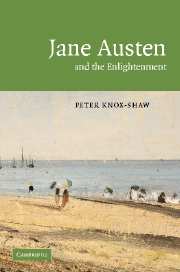Book contents
- Frontmatter
- Contents
- Acknowledgements
- Note on chronology
- PART ONE THE EIGHTEENTH-CENTURY LEGACY
- 1 Auspices
- 2 Pride and Prejudice, a politics of the picturesque
- 3 Northanger Abbey and the liberal historians
- 4 Sense and Sensibility and the philosophers
- PART TWO ENGAGING WITH THE NEW AGE
- Select bibliography
- Index
4 - Sense and Sensibility and the philosophers
Published online by Cambridge University Press: 22 September 2009
- Frontmatter
- Contents
- Acknowledgements
- Note on chronology
- PART ONE THE EIGHTEENTH-CENTURY LEGACY
- 1 Auspices
- 2 Pride and Prejudice, a politics of the picturesque
- 3 Northanger Abbey and the liberal historians
- 4 Sense and Sensibility and the philosophers
- PART TWO ENGAGING WITH THE NEW AGE
- Select bibliography
- Index
Summary
On one site or another Godwin has been made to supply most of the shuttering for that dismal construct, Jane Austen the Anti-Jacobin. Remove the premiss that the two writers are so exactly opposed as to be complementary and such production should, in theory, stumble to a halt. If Austen is primarily a satirist who set out ‘to emulate and refute’ the radical fiction of the early nineties, it makes good sense, admittedly, to fix on Caleb Williams (1794) as the anti-type to her work, and there are, indeed, some limited gains to be had from the move. Above the din of those warring typologies for the Austen and Godwin novel that Marilyn Butler draws from Godwin's early masterpiece, one or two narrative antiphonies do make themselves heard. Catherine Morland's discovery of a cotton counterpane gains in hollowness when set against the chest that gives away the secret of Falkland, and the process by which Elizabeth Bennet breaks through her first impressions of Darcy and Wickham recalls – while it reverses – the changing status of Falkland and Caleb. But a few retorts like these hardly add up to a brief for political reaction, and to use Godwin's revolutionary classic as a yardstick for novels drafted in the late nineties is in any case to skew the record. Debate moved on rapidly through the decade, until – by its second half – Jacobin allegiances were so widely shunned that the term Anti-Jacobin becomes indefinite and misleading.
- Type
- Chapter
- Information
- Jane Austen and the Enlightenment , pp. 129 - 152Publisher: Cambridge University PressPrint publication year: 2004

